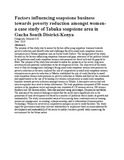| dc.description.abstract | The purpose of this study was to assess the factors influencing soapstone business towards poverty reduction and identify roles and challenges faced by small-scale soapstone women entrepreneurs at Tabaka soapstone area in Gucha South District. The background of the study focused on the factors influencing soapstone business and gaps, statement of the problem looked at the problems small scale soapstone women entrepreneurs are faced with and the gaps to be filled. The purpose of the study was intended to assess the prospects in the sector, long term investments and potential contribution to the development of area.
The objectives of the study were to find out management challenges facing small scale soapstone women entrepreneurs on poverty reduction in the area, explored the role of cooperatives in small scale soapstone women entrepreneurs on poverty reduction in Tabaka, established the role of credit facilities to small scale soapstone women entrepreneurs on poverty reduction in Tabaka and find out the constraints and opportunities in the use of technology by women entrepreneurs in small scale soapstone business towards poverty reduction amongst women in Tabaka.
A descriptive survey and oral interview guides were used to obtain information. The total population comprised of 900 women workers in the soapstone sector and sample size consisted of 120 women carvers, 500 women finishers and 280 women sellers. Data was analyzed using percentages, frequencies and tables. The analysis of the research findings revealed that the sector had a significant role in the promotion of rural development but faced by a number of problems which hinder its growth and sustainability.
The study recommended ways of overcoming these constraints such as training women on management, accounting, entrepreneurship, and in Information Communication Technology. Women be involved in cooperatives and gain access to credit facilities. The study urged the government and other relevant stakeholders to implement these recommendations for development and sustainability of the sector to enable it achieve growth while conserving the environment for the future nation | en_US |

